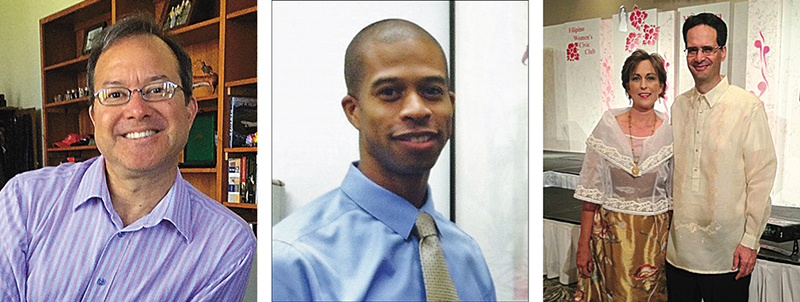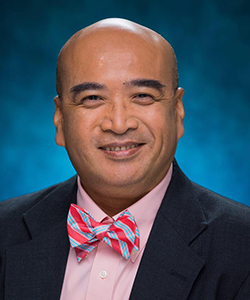
Religion and politics—usually topics to avoid at family holiday gatherings. But faith and religious values and upbringing certainly remain important to many people, including members of the Hawai‘i state legislature. A national report recently surveyed the professed religions of the U.S. Congress. Hawai‘i’s four member delegation sported two Buddhists (US Senator Mazie Hirono and Congresswoman Colleen Hanabusa), a Jew (US Senator Brian Schatz) and a Hindu (Congresswoman Tulsi Gabbard).
I asked my colleagues in the legislature whether they attend church services regularly and what role, if any, their religious faith plays in carrying out their legislative duties.
Representative Tom Brower (Waikīkī) grew up Roman Catholic and attended Catholic grammar school and high school. Romy Cachola, a Kalihi Representative, is also Roman Catholic and regularly attends Sunday Mass and “Holidays of Obligation.”
Representative Justin Woodson (Kahului) is a non-denominational Christian who attends church regularly, and who has hosted church services at his home and other locations.
Senator Karl Rhoads (Nu‘uanu-Downtown-Kalihi) remains a member in good standing of Sligo Seventh-day Adventist Church in the area where he used to live. He did not switch to a local church when he moved to Hawai‘i in part because Sligo was one of the few Adventist churches that ordains women. Having spent some time living in England, he occasionally attends services at St. Andrew’s Cathedral, an Episcopal Church.
New Hanalei representative Nadine Nakamura claims two religions—Tenrikyo (from birth) and Christianity (Episcopal). She regularly attends All Saints Episcopal Church on Kaua‘i. “My dual religions (East and West) both instill the awareness of treating everyone as brothers and sisters, to be mindful of the needs of others, especially the least fortunate, and to use the gifts we are given to make a difference.”
My own family tradition is Aglipayan (Philippine Independent Catholic Church) and my parents had me baptized into the Episcopal Church. However, they enrolled me at Doris Todd Memorial Christian Day School in Paia, and I grew up attending the Baptist Church affiliated with my school. Throughout college and law school on the mainland, I attended services at either American Baptist Churches or non-denominational congregations.
Returning home, I was a regular at First Baptist in Honolulu, joined and served at Four Square churches in Kapolei and Calvary Chapel in Wailuku before returning to my family roots in the Episcopal Church.
The place of our personal religious beliefs in our public service reflects how we view faith and our role as elected officials.
While Brower has attended many church services in his life, he says his relationship with God has evolved. “I still believe in the God of the Bible,” Brower asserts, “But I’ve become less traditional in my practice.” He considers himself spiritual—turning inward—being introspective, reflecting on his thoughts and actions, always seeking advice, wisdom and luck from what he describes as a Higher Power. “I am always in constant conversation with myself and God,” he says.
Brower notes, “As legislators, we have to consider the social impacts of our decisions on a wide variety of people, so I tend to be more objective and practical. I’m not necessarily here to represent my personal or religious feelings; I represent my constituents who elected me. For controversial issues, I try to balance my personal feelings with theirs.”
Woodson, on the other hand, observes there are some overlapping and common themes with various religions that all religious people perceive as good. “These perceptions of good, where there is consensus, stretches across all types of people, believers and non-believers alike.” Consequently, he believes, “It can be appropriate for a legislator’s faith, along with other factors to impact decisions facing the legislature.” Cachola simply notes, whether his own faith plays a part in legislative decision making, depends on the issue, and he leaves it at that.
Rhoads, who has chaired the House Judiciary committee on many controversial bills that some religious residents considered moral issues, is one of the legislature’s thoughtful Progressives on social and worker issues. “I don’t look for an Adventist answer every time I make a decision,” he observes, “But there’s no question every decision I make is affected by having grown up in the church.” Rhoads continues to “buy into much of what I learned in 14 years in Adventist schools—being honest, trying to treat people as well as you treat yourself, being ‘faithful in the little things.’”
Nakamura agrees: “I believe my religion guides me in many ways in how I conduct myself and treat others—with humility and respect.”
I tend to side with Rhoads and Nakamura. Micah 6 remains one of the Biblical passages learned in my childhood that continues to speak to me:
He has told you, O man, what is good;
And what does the Lord require of you
But to do justice, to love kindness,
And to walk humbly with your God?
Another is the Greatest Commandment as expressed by Jesus:
What commandment is the first of all? Jesus answered, The first is, Hear, O Israel; The Lord our God, the Lord is one: and thou shalt love the Lord thy God with all thy heart, and with all thy soul, and with all thy mind, and with all thy strength. The second is this, Thou shalt love thy neighbor as thyself. There is none other commandment greater than these.
Those ideas remain at the heart of my own faith and my general approach to issues that come before me at the legislature.

During the Special Session to consider Same Sex Marriage in 2013, the House of Representatives voted 30-19 in favor while the Senate voted 19-4 in support. Undoubtedly, some of the votes were cast because of personal religious convictions or those expressed by their constituents. This session, one possible challenge for legislators will be whether to join other states in allowing medical aid in dying– another issue with strong religious and moral concerns expressed against adoption of the proposal.
Brower would caution against placing so much emphasis on religion: “It’s not wise as it tends to be rigid (some people interpret the Bible very literally) and potentially divisive.” Philosophically, Brower expresses some skepticism whether traditional religion can achieve the goal of making the world better, “not because God created an imperfect system, [but] because of man’s imperfect interpretation or his own bias of God’s will.”
So while Legislators bring differing individual experiences and background to elected office, all take their duty to consider every issue seriously. How an individual legislator applies personal values and faith on issues depends on many factors. But a common theme is the value of trying to improve the quality of life and opportunities for our neighbors. And that’s one of the rewards of both public service and an abiding faith. As Rep. Nakamura puts it, “[My faith] gui
